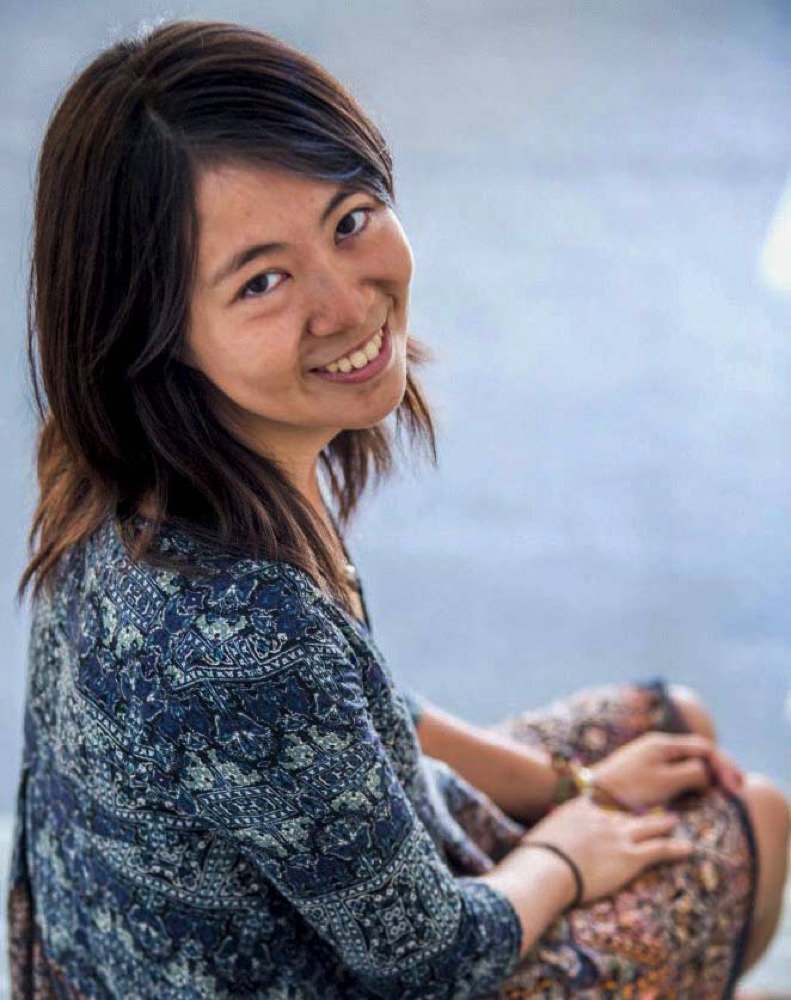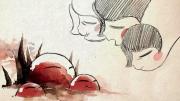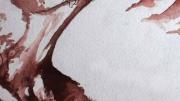Renee Zhan ’16 was hiking along a humid mountain trail in Japan when she looked down to discover that her legs and feet were covered with more than 50 leeches. “True terror is what I felt,” she recalled in a recent interview. “I spent maybe 30 minutes just picking them all off.”
But as an animator, Zhan has long been interested in the disgusting and the visceral. Her short films often feature things that eat each other—and themselves. In her latest, “Reneepoptosis,” three versions of herself go hiking through the humid folds of her own body, and their quest ends in an auto-cannibalistic feast.

Renee Zahn
Photograph by Marco Abram
There’s something grossly satisfying about the way Zhan animates. The figures, only vaguely human-shaped, plop and ooze through the landscape in a way that makes you think of body fluids. It’s unlike any other animation you’ve ever seen.
Born in Texas to two scientists—her father is a geophysicist, her mother a geneticist—Zhan loved cartoons. “It was always sort of something I thought was almost like magic,” she explained. She watched Disney movies, but also “weird old Chinese cartoons my mother showed me,” like the classic 1965 Monkey King: Havoc in Heaven. Adapted from the Chinese epic novel Journey to the West, originally published around 1592, “It was kind of dark and scary,” Zhan recalls. “Sometimes it talked about punishment and repentance…there were a lot of weird themes in there that you don’t really get in Western animation.” It fascinated her.
But it wasn’t until she started college in 2012 that she took her first animation class, a freshman seminar with Ruth Lingford, a senior lecturer in visual and environmental studies and an accomplished animator whose own work uses poems, fairy tales, and biblical stories to ask questions about sexuality, violence, aging, death, and identity. Zhan was hooked from the initial assignment: “The first time I saw something I had drawn move, it was so exciting,” she said. “I wanted to keep doing it, despite the amount of work it took.” Even today, she animates by drawing each image by hand on paper—about 12 of them make one second of film—and using watercolors for the backgrounds.
Her first animated short “was very lovely and sweet,” she recalls, before adding, “I think my work has gone on a different trajectory since then.” Indeed. Things got dark very fast: her next film was about an aquarium of neglected and starved fish who eat first their lead-laced tank decorations and then, inevitably, each other (“The stench of cannibalism was overwhelming,” reads one of the film’s title cards).
An introvert and only child, Zhan took well to the isolation of an animator’s life. She tried making documentaries during a Harvard summer-school session in Berlin, but they were unpredictable, and “having to talk to people in the world was exactly the opposite of what I wanted to do,” she said. With animation, “I can just make the film at my desk and not talk to anyone, and I have control over everything that happens on the screen, and the limitless possibility of it is what I found so attractive.”
Nonetheless, she also joined the Harvard Lampoon, and a dark sense of humor emerged in her work. She made a film about a suicidal pigeon, “Pidge,” and the avian theme carried over into her thesis film, “Hold Me (Ca Caw Ca Caw),” about a man and a bird in a co-dependent relationship. There’s a lot of man/bird sex, and, of course, someone ends up getting eaten. (Several of Zhan’s short films, including this one—as well as a trailer for “Reneepoptosis”—can be streamed online at Vimeo.com)
“Reneepoptosis” was the first film she made after graduation, but—like “Hold Me”—there’s nothing amateur about it. Zhan animated it while on a postgraduate traveling fellowship in Japan. “The fellowship afforded a lot of freedom, which was amazing—exactly what I needed,” she said. “I did a lot of hiking and spent a lot of time alone, which is where the new film came from. It’s about a bunch of Renees who go on a quest to find God, who’s also me.”
The film explores the ideas of loneliness and growth and self-discovery. Its title is adapted from “apoptosis,” the programmed cell death that occurs as a normal part of an organism’s growth and development. At first, she said, she was “quite embarrassed” about the film. “I have no idea what I just made,” she thought. “If no one likes it, I’ll bury it forever.”
Eventually she worked up the nerve to show it to Lingford. “She seemed to like it,” Zhan said, “so I was encouraged”—and in January, the film took the top prize for animated shorts at this year’s Sundance Film Festival. CineVue critic Christopher Machell, reviewing its appearance at the Toronto International Film Festival, called it “strange and charming in equal measure…an often beautiful and funny journey through the landscape of self-discovery.”
Currently Zhan is studying at the National Film and Television School in London. It’s likely that the themes she’s been working on will be those she continues to explore. “[‘Hold Me’] started out a much larger film—there was this whole narrative where the bird goes to a bird club and there’s a bird rave,” she said. “I’m writing a feature now, and the bird club is back in there.”









